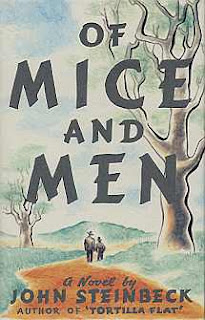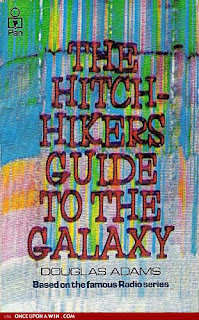
I ignored Nick Hornby's novels for some time but for entirely ridiculous reasons. 'Fever Pitch', his non-fictional account of growing up supporting Arsenal Football Club, culminates in the final game of the 1988/89 season in which Liverpool played Arsenal to decide the league title. Liverpool were favourites and could have actually lost the game by a single goal and still be crowned champions. Arsenal managed a 2-0 victory and thus stole the title away. Guess which of the two teams I support and why 'Fever Pitch' was therefore too painful for me to read?
It was the film of 'High Fidelity', Hornby's first novel, which led me to re-evaluate him as a writer. So I couldn't cope with the painful memories captured by one of his books, was this a reason to dismiss him entirely? No, of course it wasn't. And 'High Fidelity' proved that not only was Hornby as fanatical about football as me but was also completely nerdish about music too. My kind of guy, in other words, and the novels I have since read have confirmed it.
Of them all, 'A Long Way Down' is possibly his most ambitious: narrated by four different narrators in a tag-team style reminiscent of one of my other favourite contemporary authors, Chuck Palahniuk, the novel is a darkly comic interrogation of what drives people to the brink of suicide and then leads them away from the parapet again.
Put like that, of course, it doesn't sound very amusing, but Hornby mines a rich vein of macabre comedy through his four diametrically opposed characters. Martin is a disgraced Breakfast TV host whose troubles are largely of his own making. Jess is a seriously disturbed teenager who appears to have no concept of the personal space or emotional needs of others. JJ is a failed American musician reduced to delivery pizzas. And Maureen has spent the best years of her life tied to and cleaning up after a son so disabled he is practically a vegetable. They meet one New Year's Eve when all four have climbed to the top of a building which has become an infamous suicide spot. Frustrated at first that their decision to off themselves has been hindered by the presence of the others, they make a pact to try and stay alive and to meet up regularly.
Like some super-dysfunctional family their meetings are usually chaotic, argumentative and apparently pointless. And yet they keep coming together, so something about this bizarre gang of near-suicides must be doing them some good. What they learn along the way is not that they hate life but that they are far too attached to life as they want it to be and yet have not been brave enough to make the at-times hard choices which can sometimes make life feel more fulfilling.
From opening with a bunch of people ready to throw themselves off the top of a tall building Nick Hornby fashions a hilarious, touching, astonishingly believable tale of four misfits attempting to turn around the tragic supertanker of their individual lives. He gets under the skin of his characters with an apparently effortless ability to reveal depth and detail with the lightest of touches. For me this is Hornby's best writing, if not quite his best novel. The conclusion, though satisfying despite being open-ended, does not underline the entire thread of the narrative in the same way as does 'High Fidelity'. Perhaps there could be a sequel? And while we're on the subject of sequels, could he not write about Arsenal's last four, trophy-less seasons, just to cheer me up on the football front too?
It was the film of 'High Fidelity', Hornby's first novel, which led me to re-evaluate him as a writer. So I couldn't cope with the painful memories captured by one of his books, was this a reason to dismiss him entirely? No, of course it wasn't. And 'High Fidelity' proved that not only was Hornby as fanatical about football as me but was also completely nerdish about music too. My kind of guy, in other words, and the novels I have since read have confirmed it.
Of them all, 'A Long Way Down' is possibly his most ambitious: narrated by four different narrators in a tag-team style reminiscent of one of my other favourite contemporary authors, Chuck Palahniuk, the novel is a darkly comic interrogation of what drives people to the brink of suicide and then leads them away from the parapet again.
Put like that, of course, it doesn't sound very amusing, but Hornby mines a rich vein of macabre comedy through his four diametrically opposed characters. Martin is a disgraced Breakfast TV host whose troubles are largely of his own making. Jess is a seriously disturbed teenager who appears to have no concept of the personal space or emotional needs of others. JJ is a failed American musician reduced to delivery pizzas. And Maureen has spent the best years of her life tied to and cleaning up after a son so disabled he is practically a vegetable. They meet one New Year's Eve when all four have climbed to the top of a building which has become an infamous suicide spot. Frustrated at first that their decision to off themselves has been hindered by the presence of the others, they make a pact to try and stay alive and to meet up regularly.
Like some super-dysfunctional family their meetings are usually chaotic, argumentative and apparently pointless. And yet they keep coming together, so something about this bizarre gang of near-suicides must be doing them some good. What they learn along the way is not that they hate life but that they are far too attached to life as they want it to be and yet have not been brave enough to make the at-times hard choices which can sometimes make life feel more fulfilling.
From opening with a bunch of people ready to throw themselves off the top of a tall building Nick Hornby fashions a hilarious, touching, astonishingly believable tale of four misfits attempting to turn around the tragic supertanker of their individual lives. He gets under the skin of his characters with an apparently effortless ability to reveal depth and detail with the lightest of touches. For me this is Hornby's best writing, if not quite his best novel. The conclusion, though satisfying despite being open-ended, does not underline the entire thread of the narrative in the same way as does 'High Fidelity'. Perhaps there could be a sequel? And while we're on the subject of sequels, could he not write about Arsenal's last four, trophy-less seasons, just to cheer me up on the football front too?





